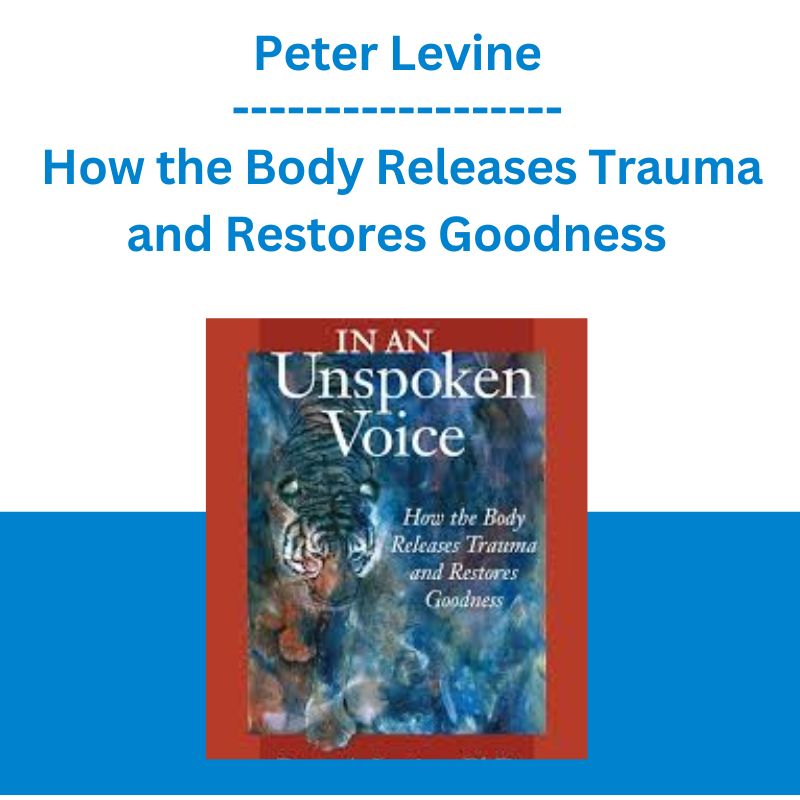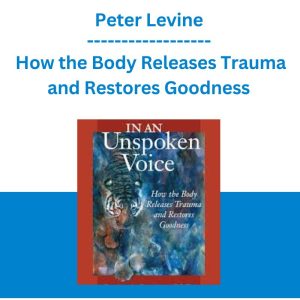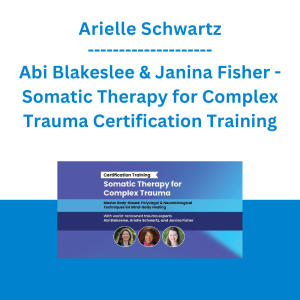*** Proof of Product ***

Exploring the Essential Features of “Peter Levine – How the Body Releases Trauma and Restores Goodness”
Description
International trauma expert and author, Peter A. Levine, Ph.D. will teach you how sensation-based treatment (as opposed to emotional or rational-based treatment) can be effective for trauma treatment. He discusses the important principles in successful trauma treatment, and uses his own successful renegotiation of a personal traumatic event as an example.
Representing the full scope of his life’s work, Dr. Levine discusses the evolutionary underpinnings of trauma. This recording includes an in-depth review of how trauma is related to the ethnological concept of tonic immobility, as well as the roadmap of the Polyvagal system – a fascinating neurophysiological model for understanding how we shift between the states of fight-or-flight, shutdown, and social engagement. Dr. Levine provides simple containment tools to help you develop your awareness of these state changes in order to more effectively engage your client in trauma therapy.
Speaker
Peter Levine, PhD
Dr. Peter Levine holds doctorates in both medical biophysics and psychology. He is the developer of Somatic Experiencing® (SE), a naturalistic body-awareness approach to healing trauma, which he teaches all over the globe. Dr. Levine is also the founder of the Foundation for Human Enrichment and was a stress consultant for NASA during the development of the space shuttle.
An accomplished author, Dr. Levine penned Healing Trauma, Sexual Healing and the bestselling book, Waking the Tiger. He also co-authored with Maggie Kline Trauma Through a Child’s Eyes and Trauma-Proofing Your Kids. His latest book, In an Unspoken Voice: How the Body Releases Trauma and Restores Goodness, is a testament to his lifelong investigation into the connection between evolutionary biology, neuroscience, animal behavior, and more than 40 years of clinical experience in the healing of trauma.
Dr. Levine was honored in 2010 with a Lifetime Achievement Award from the United States Association for Body Psychotherapy (USABP) and is a Senior Fellow at Meadows Behavioral Healthcare.
Speaker Disclosures:
Financial: Dr. Peter Levine is the founder and president of the Ergos Institute of Somatic Education, the president and editorial director of Ergos Institute Press, and receives a consulting fee from the Meadows Addiction Center. He receives royalties as a published author. Dr. Levine receives a speaking honorarium, recording, and book royalties from Psychotherapy Networker and PESI, Inc. He has no relevant financial relationships with ineligible organizations.
Non-financial: Dr. Peter Levine is a senior clinical fellow and advisor to the Meadows Addiction Treatment Center. He is a member of the American Psychological Association, the Humanistic Psychological Association, and the International Society for Traumatic Stress Studies.
Target Audience
Counselors, Social Workers, Psychologists Psychotherapists, Therapists, Marriage and Family Therapists, Addiction Counselors, Occupational Therapists, Occupational Therapy Assistants, Case Managers, Nurses, School Psychologists, Other Helping Professional
Objectives
- Articulate the four major developmental stages that increase vulnerability to trauma and how to recognize them in your clients.
- Determine the naturalistic mechanics of trauma and survival responses of flight, fight, freeze and collapse as it relates to clinical treatment.
- Discover the evolutionary underpinnings of trauma and the Polyvagal theory and their clinical implications.
- Demonstrate the importance of “Bottom-up” processing versus “Top Down” processing to improve treatment outcomes.
- Summarize the process of how overwhelming stress leads to somatic and emotional syndromes in clients.
- Incorporate Dr. Levine’s simple containment tools in order to more effectively engage your client in trauma therapy.
Outline
Child Development: The Signs of Trauma in Each Developmental Period:
- Pre-Natal
- Hormonal interactions between mother and child
- Birth Stress
- Year One
- Safety, affection and containment
- Proprioceptive development
- The Dopamine System
- The space to explore one’s effect on the world
- The formation of a self that is different from Mom and Dad
- Testing boundaries
- Age 3-5
- The Biology and balance of shame
- The importance of shame in society
- The signs of overshaming
- The signs of undershaming
- The initial forays into sexuality
- The importance of flirting
- How these sames stages replay themselves out in later life
- The initial forays into sexuality
The Naturalistic Mechanisms of Trauma
- Understanding our primary survival tactics and how they play out in the body: Flight, fight, freeze and collapse
- 500 million years of evolution: Our Polyvagal underpinnings
- How the Dorsal Vagal System is related to shutdown and collapse
- Fight or flight: Sympathetic/adrenal System mobilization, Returning to our Mammalian birthright: The Ventral vagal system and social engagement
- How we get “stuck”
- Tonic immobility – The fallback to freeze
- Freeze couples with Fear
- Dissociation
- Bracing and terror
- Euphoric dissociation
- Collapse
- Somatic and emotional – syndromes and complexes
- Emotional – anxiety, depression
- Somatic – chronic pain, fibromyalgia
- Autonomic – migraines, irritable bowel
Resolving Traumatic Reactions
- The importance of “Bottom-Up” processing
- The Paul MacLean’s Triune Brain
- In an Unspoken Voice
- Somatic Experiencing©
- Renegotiation vs. Reliving
- Restoration of self-regulation
- Trauma isn’t about the event, but the body’s inability to process and integrate the nervous system charge
- The importance of developing a felt sense
- The nine basic stages of trauma treatment
- Containment of strong sensation and emotion
- Pendulation – The dual opposites of sensation
- Titration – going gradually
- Completion
- Renegotiation of active for passive responses
- Simple exercises that you can use in your practice
Spirituality and Trauma
- Trauma as one of the 4 avenues to enlightment
- Lessons from the Kundalini
- A feeling of “okayness”, wholeness and trust in the world
- And other side effects of effective trauma treatment
- The importance of maintaining balance in one’s life
Reviews
Pamela F
“This was an extremely valuable training for me!”
Maurice Keith M
“I love you PESI. Keep up all the good work and excellent course offerings!”
Tanya C
“Wonderful presentation. I use Theraplay daily with my trauma hildren, so at the end when he mentioned the Theraplay Institute, it made my heart happy”
Please see the full list of alternative group-buy courses available here: https://lunacourse.com/shop/










 Peter Levine - How the Body Releases Trauma and Restores Goodness
Peter Levine - How the Body Releases Trauma and Restores Goodness  Arielle Schwartz, Abi Blakeslee & Janina Fisher - Somatic Therapy for Complex Trauma Certification Training: Body-Based, Polyvagal & Neurobiological Techniques for Mind-Body Healing
Arielle Schwartz, Abi Blakeslee & Janina Fisher - Somatic Therapy for Complex Trauma Certification Training: Body-Based, Polyvagal & Neurobiological Techniques for Mind-Body Healing  Joe Navarro - Online Advanced Speed Reading People Course
Joe Navarro - Online Advanced Speed Reading People Course  Igor Ledochowski - Street Hypnosis Masterclass For The Next Generation Of Hypnosis Masters
Igor Ledochowski - Street Hypnosis Masterclass For The Next Generation Of Hypnosis Masters  Igor Ledochowski - Unleash the Power of Your Mind
Igor Ledochowski - Unleash the Power of Your Mind  Igor Ledochowski - The Power of Self-Hypnosis For Guaranteed Results
Igor Ledochowski - The Power of Self-Hypnosis For Guaranteed Results  Gemma Bonham-Carter - The Passive Project
Gemma Bonham-Carter - The Passive Project